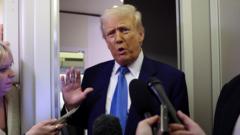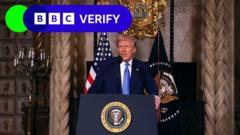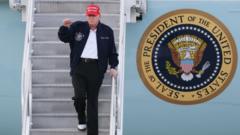European leaders face the challenge of responding to the U.S.-Russia negotiations led by Secretary of State Marco Rubio, prompting concerns over Ukraine's exclusion from discussions meant to end the ongoing conflict.
Negotiations Without Ukraine: Europe Feels Left Out Amid U.S.-Russia Talks

Negotiations Without Ukraine: Europe Feels Left Out Amid U.S.-Russia Talks
As the U.S. pursues talks with Russia, European nations scramble to assert influence while Ukrainian participation remains uncertain.
Amidst increasing diplomatic activity, American officials are set to engage in talks with Russia regarding the war in Ukraine, while European countries seek to outline their position in light of President Trump's strategy to negotiate independently. Over the weekend, the Kremlin's ambassador to Saudi Arabia met with local officials, signaling the pivotal role of a regionally significant state in these discussions.
Key Trump administration figures, including officials like Mike Waltz and Middle East envoy Steve Witkoff, are slated to accompany Rubio for negotiations, although the identities of Russian officials involved remain unspecified. Rubio, speaking from Jerusalem, highlighted the possibility of broader discussions that could incorporate Ukraine and involve collaboration with European allies, yet no confirmations of such hard agreements were provided.
These developments indicate an urgent response from European leaders, reflecting apprehensions about being sidelined in a process with potential implications for the security and territorial integrity of Ukraine. The absence of a clear Ukrainian role during pivotal diplomatic negotiations raises significant questions about the future of the conflict and regional stability.
As tensions remain high, the clarity of Europe's influence in the talks and the potential repercussions on their alliance with Ukraine stand in focus, posing a complex diplomatic landscape as the U.S. aims for a rapid settlement.
Key Trump administration figures, including officials like Mike Waltz and Middle East envoy Steve Witkoff, are slated to accompany Rubio for negotiations, although the identities of Russian officials involved remain unspecified. Rubio, speaking from Jerusalem, highlighted the possibility of broader discussions that could incorporate Ukraine and involve collaboration with European allies, yet no confirmations of such hard agreements were provided.
These developments indicate an urgent response from European leaders, reflecting apprehensions about being sidelined in a process with potential implications for the security and territorial integrity of Ukraine. The absence of a clear Ukrainian role during pivotal diplomatic negotiations raises significant questions about the future of the conflict and regional stability.
As tensions remain high, the clarity of Europe's influence in the talks and the potential repercussions on their alliance with Ukraine stand in focus, posing a complex diplomatic landscape as the U.S. aims for a rapid settlement.























